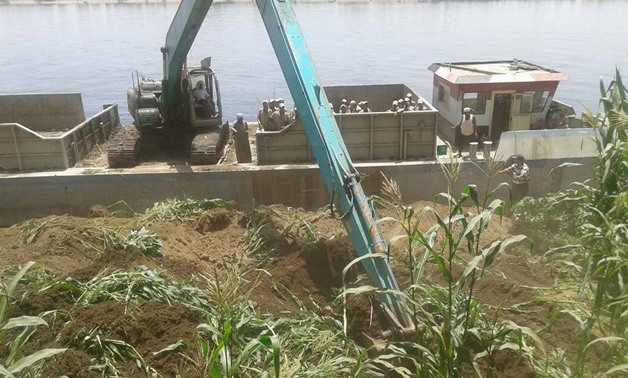
Ministry of Water Resources and Irrigation remove illegal building on the Nile bank- press photo
CAIRO – 6 July 2017: Egypt’s House of Representatives is mulling new amendments to the Law of Irrigation, to toughen the punishment for encroachments on the Nile water, amid water scarcity that a 91-million-people’s country suffers from.
The amendments, which have been drafted by the Ministry of Water Resources and Irrigation, label encroachment crime as a felony, which is punishable by prison, not as a misdemeanor, according to a Ministry’s statement on the draft law in June.
The encroachments include illegal construction on the Nile’s banks, unlicensed fish farming, industrial waste and other forms of pollution.
The crime penalties will be determined after being discussed in detail before the Parliament, based on the type of the crimes committed, Ministry Spokesperson Hosam el-Emam told Egypt Today Thursday.
Since January 2015, the Ministry has launched a campaign to remove violations that had been detected by the government on the Nile banks. As per the Ministry’s latest data, which was announced Tuesday, a total of 26,322 violations of encroachment on the Nile banks have been removed. Since March 2017, a total of 12,425 cases of encroachment were removed, according to the data.
Here is a map shows the number of violations on the Nile banks in each governorate since March 2017:
The amendments, which have been conducted to the Law No. 12 of 1984, also include a new chapter on monitoring the system of underground aquifers; Egypt has non-renewable aquifers (Moghra, the Carbonate aquifer, Nubian Sandstone aquifer, Toshka aquifer, and an aquifer at Tor Sinai). The Ministry also drafted a new chapter on management of floods.
The Ministry acknowledged that the new draft law has been written to face various challenges Egypt suffers, according to June statement.
It added that challenges boil down to the following: the limited required water resource, high rate of water resource pollution, increasing water demands in many fields, growing encroachments on irrigation networks and utilities, the need to expand reclaimed lands nationwide, the climate change impacts, the high risks of rains and floods.
Egypt’s average water resources per capita have dropped to 663 cubic meters per year, and are expected to plummet to 582 cubic meters by 2025, according to the Central Agency for Public Mobilization and Statistics (CAPMAS) in 2014; meanwhile the international benchmark is 1,000 cubic meters annually per capita.
In a speech before the Parliament in May 2016, Water Resources and Irrigation Minister Mohamed Abdel-Atti said that Egypt’s water resources produce 62 billion cubic meters annually while the consumption could reach 80 billion cubic meters. He said that the drought in Egypt could continue into 2017.

Comments
Leave a Comment